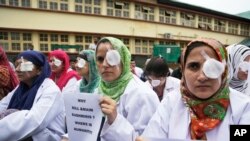India’s home minister on a visit to Kashmir said substitutes will soon be found for pellet guns that have blinded or caused severe eye injuries to hundreds of people during the worst protests to have wracked the Himalayan region in six years.
The use of pellet guns by security forces to quell the demonstrations has flooded hospitals with victims and triggered huge anger in Kashmir. Human rights groups, such as Amnesty International, have called for prohibiting their use.
Wrapping up a two-day visit to Kashmir’s capital, Srinagar, Minister Rajnath Singh said that a panel looking into the use of pellet-firing guns will submit its report in two or three days.
“It was believed in 2010 that the pellet gun is a non-lethal weapon that causes the least damage. But today we feel the need for an alternate,” said Singh. He is visiting the region in a bid to explore a solution to the unrest that has gripped India’s only Muslim majority region since the killing of a local militant by security forces last month.
The victims of pellet guns have included a 9-year-old, who was hit as she watched a demonstration through her window.
At a news conference, the Indian minister also appealed to Kashmiris to return to the path of peace, saying that “young people of 17, 18, 15 and 20, should have computers, books and pens in their hands." He then asked, “Who gives them permission to put stones in their hands?”
Young men have been at the forefront of massive anti-India demonstrations, often pelting stones at security forces.
Kashmir’s chief minister, Mehbooba Mufti, said a majority of people in the Kashmir Valley favor a peaceful solution to the current unrest and said that the “five per cent” involved in the protests “are using young people as shields to attack camps of security forces.”
Tight security
The Indian minister’s visit took place amid tight security as much of the region, including the capital, remained shuttered under a curfew.
While Singh said New Delhi is willing to talk to separatist groups, separatist leaders questioned how they could join a dialogue as most have been placed under house arrest.
The volatile situation in Indian Kashmir has also deepened tensions and triggered a sharp war of words between India and Pakistan, whose rivalry is sparked by conflicting claims on the Himalayan territory, which is divided between them.
Pakistan, which has called for "putting an immediate end to the human rights violations against the innocent people" of Kashmir, has twice invited New Delhi for talks on the region in the last 10 days, but India says it will only hold a dialogue on cross-border terrorism.
In its latest answer to Islamabad, Indian Foreign Secretary S. Jaishankar virtually rejected the invitation saying in a letter that he was only willing to discuss terrorism emanating from Pakistan's territory, which targets not just India but other countries as well.












